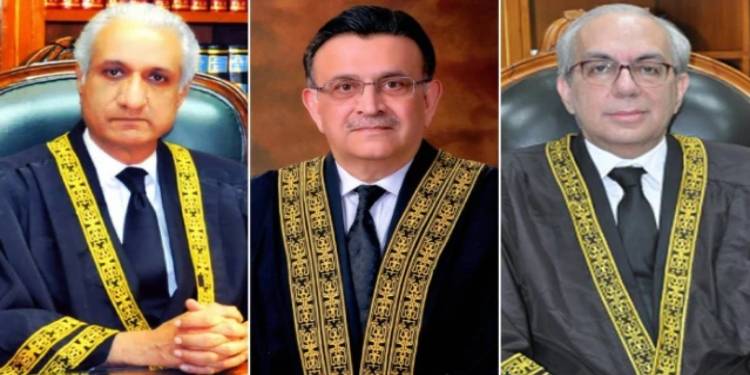
The hearing on the Election Commission of Pakistan's (ECP) plea challenging the Supreme Court's (SC) directive to hold Punjab's general elections on May 14 was adjourned by the apex court on Monday for an indeterminate period of time after the court was informed that a statute allowing for the review of suo motu rulings had taken effect.
Following President Arif Alvi's approval, the Supreme Court Review of Judgements and Orders Bill, 2023, went into effect on Friday. According to the law, the case will be heard by a larger bench than the one that made the decision in order to review a suo motu verdict.
The plea was heard today before a three-member bench presided over by Chief Justice of Pakistan Umar Ata Bandial, including Justices Ijaz Ul Ahsan and Munib Akhtar.
The April 4 judgment was rendered by this same bench in accordance with Article 184 (3), also known as the suo motu statute. The commission had been asked to hold elections in Punjab in the middle of May, and the federal and Punjabi governments had been told to support the ECP.
During the hearing, Attorney General for Pakistan (AGP) Mansoor Usman Awan arrived at the podium and stated that he wanted to make specific points.
He said that the Supreme Court (Review of Judgements and Orders) Bill 2023 had become law following the president's signature. The scope of review and appeal is currently the same, in accordance with the new law.
The AGP continued by objecting to the case being considered by a three-member bench and asserting that a larger bench was required to hear the review.
In this instance, Justice Akhtar remarked, "The ECP lawyer has a smile on his face after hearing about the Supreme Court (Review of Judgements and Orders) Bill 2023."
In the meantime, the CJP said that the apex court would resume considering a series of petitions filed to contest the government-appointed judicial commission charged with investigating audio leaks.
"I assume you have seen our order on the audio leak commission. Remember that the commission was not declared invalid by the court," Justice Bandial remarked.
The chief justice remarked that the court also needed to defend the judiciary's right to freedom. The chief justice declared, "Matters cannot be handled on the basis of secret meetings."
Following President Arif Alvi's approval, the Supreme Court Review of Judgements and Orders Bill, 2023, went into effect on Friday. According to the law, the case will be heard by a larger bench than the one that made the decision in order to review a suo motu verdict.
The plea was heard today before a three-member bench presided over by Chief Justice of Pakistan Umar Ata Bandial, including Justices Ijaz Ul Ahsan and Munib Akhtar.
The April 4 judgment was rendered by this same bench in accordance with Article 184 (3), also known as the suo motu statute. The commission had been asked to hold elections in Punjab in the middle of May, and the federal and Punjabi governments had been told to support the ECP.
During the hearing, Attorney General for Pakistan (AGP) Mansoor Usman Awan arrived at the podium and stated that he wanted to make specific points.
He said that the Supreme Court (Review of Judgements and Orders) Bill 2023 had become law following the president's signature. The scope of review and appeal is currently the same, in accordance with the new law.
The AGP continued by objecting to the case being considered by a three-member bench and asserting that a larger bench was required to hear the review.
In this instance, Justice Akhtar remarked, "The ECP lawyer has a smile on his face after hearing about the Supreme Court (Review of Judgements and Orders) Bill 2023."
In the meantime, the CJP said that the apex court would resume considering a series of petitions filed to contest the government-appointed judicial commission charged with investigating audio leaks.
"I assume you have seen our order on the audio leak commission. Remember that the commission was not declared invalid by the court," Justice Bandial remarked.
The chief justice remarked that the court also needed to defend the judiciary's right to freedom. The chief justice declared, "Matters cannot be handled on the basis of secret meetings."

